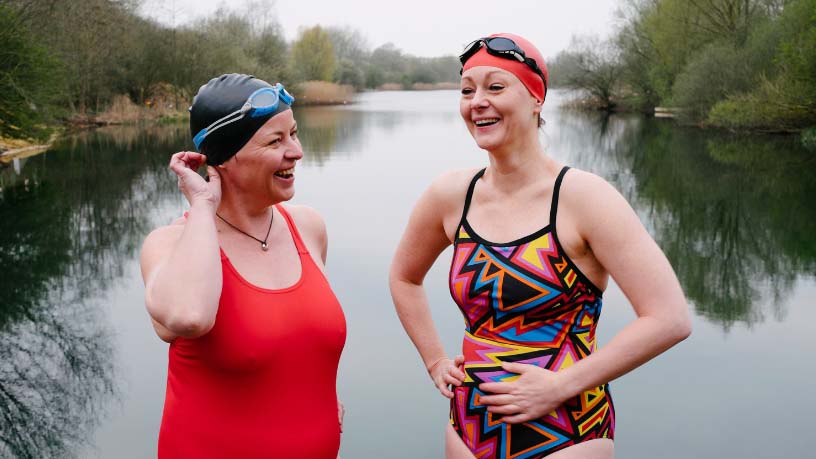Find out how you can check if you’re overweight.
On this page
Key takeaways
Learn about the dangers of rapid weight loss.
Get actionable, sustainable tips for starting a weight-loss journey from an expert.
Taking the first step in a weight-loss journey can be tough. What can be even tougher, though, is keeping the weight off.
Are you overweight?
In Australia, 2 out of 3 adults and 1 out of 4 children are considered overweight or obese, which carries numerous health risks, including:
- heart disease
- type 2 diabetes
- stroke
- high blood pressure
- some cancers.1
One way to measure your risk is by calculating your ‘body mass index’ (BMI), which considers your weight and height. For most adults, a BMI that’s:
- under 18.5 means you’re underweight
- between 18.5 and 24.9 means you’re within the healthy range
- between 25 and 29.9 means you’re overweight
- over 30 means you’re obese.
According to Bupa Dietitian Emma Lucas, it’s important to use the BMI as a general guide as it “does not take into consideration other factors of your health or muscle mass.”
“Waist circumference can be a better predictor of health risk due to body fat found around the abdomen which sits around important organs, such as your kidney, liver and pancreas,” says Lucas.
To measure your waist circumference, breathe out normally and then firmly run a tape measure around the area halfway between the top of your hip bone and your lowest rib, roughly in line with your belly button. Your health may be at risk if your waist measures:
- over 94cm for men
- over 80cm for women.2
Do rapid weight-loss diets work?
Lucas says that weight gain usually results from a “diet high in calorie-dense foods (like fast food, baked goods and processed food), not being aware of portion control and a low amount of physical activity.”
So eating very little and exercising a lot will help you achieve your weight-loss goals, right? Actually, no.
Rapid weight-loss diets don’t work in the long term, and can even be dangerous.3
“Dietary restrictions can cause people to exclude foods that are beneficial to our health,” says Lucas. “Excluding entire food groups can increase the risk of nutrient deficiencies and bowel issues. Every food group belongs in a healthy, balanced diet.”
What’s more, a common mistake that Lucas notices people make when they start a weight-loss journey is the ‘all-or-nothing’ approach.
Strict fad diets like the Atkins, ketogenic and paleolithic diets each promote rapid weight loss by eliminating or restricting certain foods. But studies have shown that, while these diets may provide short-term benefits, people tend to not stick to them.4
“Whilst people can adhere to this for a couple of days, it is not sustainable long term,” Lucas says, “and many revert to their previous habits without seeing progress.”
It’s also important to avoid fad diets that promote the opposite approach (eating lots of food) which “can be detrimental to our health,” Lucas adds.
So, how do you lose weight and actually keep it off?
The best (and safest) way to start a weight-loss journey is to begin slowly, with clear and realistic goals.
Lucas recommends initially aiming for between 0.5 to 1kg of weight loss per week, “whilst consuming a healthy, balanced diet high in protein, and exercising on most if not all days of the week.”
In Australia, current guidelines for physical activity recommend that adults do either:
- 2.5 to 5 hours a week of moderate exercise, like walking or swimming
- 1.25 to 2.5 hours a week of more intense activity, like running or cycling.5
Here are Lucas’ top tips to help you start your weight-loss journey on the right foot:
Think about where you're starting
Before you begin a new diet and exercise regime, think about your current lifestyle and health habits and consider what, exactly, needs changing. And how you can realistically tackle that change.
Of course, diet and exercise are the main ways to lose weight. But it also pays to consider other important weight-loss factors, such as reducing stress and getting better sleep.6
Get "SMART"
A good way to plan out your new health regime is to create goals that are SMART: specific, measurable, attainable, realistic and timely.
“Setting realistic goals can help with the ‘all-or-nothing’ mindset, which can help reduce burnout,” says Lucas. “Start by making small lifestyle changes that are sustainable instead of trying to change everything at once, as this can be overwhelming.”
Meal prep
Lucas says that preparing your meals and snacks for the week helps take the guesswork out of healthy eating.
Meal prepping not only saves time and money, but it’s also known to help you make better and more controlled decisions about what you’re eating, avoiding those last-minute takeaway orders and maintaining a more nutritionally balanced diet.7
Make sure your goals fit within your lifestyle and you can stick to them long term
The trickiest part of a weight loss journey can be keeping the weight off long term. So, it’s a good idea to have a plan that you can actually stick to.
“Consider speaking to a qualified health professional, such as a doctor, dietitian or exercise physiologist for guidance,” Lucas recommends. “This may be particularly important if you’re managing other health conditions while trying to lose weight.”
And as the weeks turn into months, remember that routine is key.
“Continue to practise the same sustainable habits,” says Lucas, “such as watching your portions, moving your body preferably most days and enjoying everything in moderation.”

At Bupa, trust is everything
Our health and wellbeing information is regularly reviewed and maintained by a team of healthcare experts, to ensure its relevancy and accuracy. Everyone's health journey is unique and health outcomes vary from person to person.
This content is not a replacement for personalised and specific medical, healthcare, or other professional advice. If you have concerns about your health, see your doctor or other health professional.
1Australian Government, Department of Health and Aged Care. (2021). About overweight and obesity. Australian Government, Department of Health and Aged Care.
2Heart Foundation. (2024). What waist measurements mean for your heart. Heart Foundation.
3Shmerling, R. H. (2020). When dieting doesn’t work. Harvard Health Publishing, Harvard Medical School.
4Tahreem, A., Rakha, A., Rabail, R., Nazir, A., Socol, C. T., Maerescu, C. M., & Aadil, R. M. (2022). Fad Diets: Facts and Fiction. Frontiers in Nutrition, 9, 960922.
5Department of Health and Aged Care. (2021). Physical activity and exercise guidelines for adults (18 to 64 years). Australian Government, Department of Health and Aged Care.
6Xenaki, N., Bacopoulou, F., Kokkinos, A., Nicolaides, N. C., Chrousos, G. P., & Darviri, C. (2018). Impact of a stress management program on weight loss, mental health and lifestyle in adults with obesity: a randomized controlled trial. Journal of Molecular Biochemistry, 7(2), 78-84.
7Harvard, T. H. Chan School of Public Health. (2024). Meal prep guide. Harvard, T. H. Chan School of Public Health.
You might also like...
Healthier versions of your favourite comfort food
Eating a healthier diet doesn’t mean you have to give up all your favourite comfort foods. Check out these recipe tips for delicious, nutritious meals.
50 healthy food swaps
Small changes to your diet can have a big impact on your health. To make it easy, we’ve put together 50 healthier food swaps you can make for the whole family.
5 tips to start exercising (and stick with it)
Exercising regularly is one of the best things you can do for your health, but it’s not always easy to get started. Try these 5 tips to help get moving.
How to set goals and actually stick to them
You probably know that it’s important to set goals, but how good are you at sticking to them? Learn to stay on track with this expert advice.





